North Carolina General Assembly of 1785
The North Carolina General Assembly of 1785 met in New Bern from November 18, 1785, to December 29, 1785. The assembly consisted of the 114 members of the North Carolina House of Commons and 54 senators of North Carolina Senate elected by the voters on August 19, 1785. During the 1785 session, the legislature created Rockingham County. As prescribed by the 1776 Constitution of North Carolina the General Assembly elected Richard Caswell to continue as Governor of North Carolina and members of the Council of State.[1][2][3][4][5]
| 10th North Carolina General Assembly (1785) | |||||
|---|---|---|---|---|---|
| |||||
| Overview | |||||
| Legislative body | North Carolina General Assembly | ||||
| Jurisdiction | North Carolina, United States | ||||
| Meeting place | New Bern | ||||
| Term | 1785 | ||||
| Senate | |||||
| Members | 54 Senators | ||||
| Speaker | Alexander Martin | ||||
| Clerk | John Haywood | ||||
| Assistant Clerk | Sherwood Haywood | ||||
| Doorkeeper | William Murphy | ||||
| Assistant Doorkeeper | Nicholas Murphy | ||||
| House of Commons | |||||
| Members | 114 Delegates Authorized | ||||
| Speaker | Richard Dobbs Spaight | ||||
| Clerk | John Hunt | ||||
| Assistant Clerk | John Haywood | ||||
| Doorkeeper | Peter Gooding | ||||
| Assistant Doorkeeper | James Malloy | ||||
| Sessions | |||||
| |||||
Councilors of State
As prescribed by the 1776 Constitution of North Carolina, the General Assembly elected Richard Caswell as governor on December 9, 1785, and the following members of the North Carolina Council of State:[1][5]
- Joseph Leech, Craven County, President, elected on December 10, 1785,
- James Gillespie, Duplin County, elected on December 10, 1785
- Winston Caswell, Dobbs County, Clerk[note 1]
- John Hawks, Craven County, elected on December 10, 1785
- William McClure, Craven County, elected on December 10, 1785
- John Spicer, Onslow County, elected on December 10, 1785[6]
- Green Hill, Franklin County, elected on December 12, 1785
- Miles King, Richmond County, elected on December 28, 1785
James Glasgow continued as North Carolina Secretary of State.
Assembly membership
House of Commons members
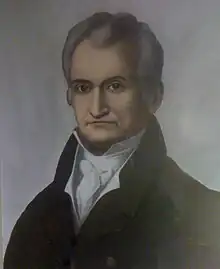
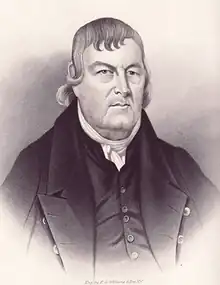
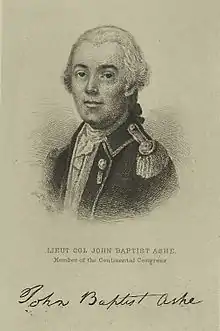
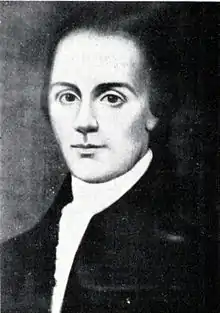
There were 114 positions authorized for the House of Commons in this assembly, including one representative from each of six districts and 54 counties. Only 105 delegates are known to have attended this House of Commons assembly.[7][5]
Fayette County, which was formed in July 1784 from the eastern part of Cumberland County, reverted to Cumberland County three months later, so does not appear in this assembly.[5]
Greene, Sullivan and Washington Counties had formed the State of Franklin in an attempt to create a new state. They did not send representatives to this assembly.[8][9]
Anson, Bladen, and Gates County only sent one elected official to the House of Commons.[5]
The House of Commons delegates elected a Speaker (Richard Dobbs Spaight), Clerk (John Hunt), Assistant Clerk (John Haywood), Doorkeeper (Peter Gooding), and Assistant Doorkeeper (James Malloy). The following delegates to the House of Commons were elected by the voters of North Carolina to represent each county and district:[3][4][5][7]
| County/District | Delegate |
|---|---|
| Anson | James Terry[note 2] |
| Anson | Vacant / Unknown |
| Beaufort | Henry Smaw |
| Beaufort | John Gray Blount[10] |
| Bertie | Thomas Collins |
| Bertie | Andrew Oliver |
| Bladen | James Richardson |
| Bladen | Vacant / Unknown |
| Brunswick | Jacob Leonard |
| Brunswick | David Flowers |
| Burke | Joseph McDowell |
| Burke | Waightstill Avery |
| Camden | Enoch Sawyer |
| Camden | Selby Harney |
| Carteret | David Cooper |
| Carteret | Eli West |
| Caswell | Robert Dickens |
| Caswell | Adam Sanders |
| Chatham | Joseph Stewart |
| Chatham | Roger Griffith |
| Chowan | Dr. Hugh Williamson |
| Chowan | Clement Hall |
| Craven | Richard Dobbs Spaight |
| Craven | Abner Neale |
| Cumberland | Robert Rowan |
| Cumberland | David Smith |
| Currituck | Joseph Ferebee |
| Currituck | Dr. James White |
| Davidson | Elijah Robertson |
| Davidson | William Polk |
| Dobbs | Benjamin Coleman |
| Dobbs | William Sheppard |
| Duplin | Robert Dickson |
| Duplin | Joseph Thomas Rhodes |
| Edgecombe | Robert Diggs |
| Edgecombe | Etheldred Phillips |
| Franklin | Thomas Sherrod |
| Franklin | Durham Hall |
| Gates | Vacant / Unknown |
| Gates | Seth Riddick |
| Granville | Thomas Person |
| Granville | Philemon Hawkins, Jr. |
| Greene | Vacant |
| Greene | Vacant |
| Guilford | John Hamilton |
| Guilford | Barzillai Gardner |
| Halifax | John Whitaker |
| Halifax | John Baptista Ashe |
| Hertford | James Manney |
| Hertford | Robert Montgomery |
| Hyde | John Eborne |
| Hyde | Thomas Jordan, Jr.[note 3] |
| Johnston | Hardy Bryan |
| Johnston | Benjamin Williams |
| Jones | Abner Nash |
| Jones | John Isler |
| Lincoln | John Sloan |
| Lincoln | Daniel McKissick |
| Martin | Edmund Smithwick |
| Martin | Samuel Williams |
| Mecklenburg | Caleb Phifer |
| Mecklenburg | George Alexander |
| Montgomery | James McDonald |
| Montgomery | Charles Robertson |
| Moore | John Cox |
| Moore | John Carroll |
| Nash | Micajah Thomas |
| Nash | John Bonds |
| New Hanover | James Bloodworth |
| New Hanover | John Pugh Williams |
| Northampton | Howell Edmunds |
| Northampton | Augustin Woods |
| Onslow | Edward Starkey |
| Onslow | Reuben Grant |
| Orange | William Courtney |
| Orange | William Cain |
| Pasquotank | Edward Everagin |
| Pasquotank | Abraham Symons |
| Perquimans | John Skinner |
| Perquimans | Robert Riddick |
| Pitt | John Jordan |
| Pitt | Richard Moye |
| Randolph | Joseph Robbins |
| Randolph | Aaron Hill |
| Richmond | Robert Webb |
| Richmond | Benjamin Covington |
| Rowan | Matthew Locke |
| Rowan | George Henry Barrier, aka George H. Berger |
| Rutherford | Richard Singleton |
| Rutherford | George Moore |
| Sampson | David Dodd |
| Sampson | John Hay |
| Sullivan | Vacant |
| Sullivan | Vacant |
| Surry | William Lewis |
| Surry | James Martin |
| Tyrrell | Nehemiah Norman[note 4] |
| Tyrrell | Nathan Hooker |
| Wake | James Hinton |
| Wake | William Hayes |
| Warren | Henry Montfort |
| Warren | Wyatt Hawkins |
| Washington | Vacant |
| Washington | Vacant |
| Wayne | William Taylor |
| Wayne | John Handley |
| Wilkes | Jesse Franklin |
| Wilkes | William T. Lewis |
| Edenton District | Stephen Cabarrus |
| Halifax District | Dr. Charles Pasteur |
| Hillsborough District | John Taylor |
| New Bern District | William Tisdale |
| Salisbury District | Thomas Frohock[11] |
| Wilmington District | Archibald MacLaine |
Senate members
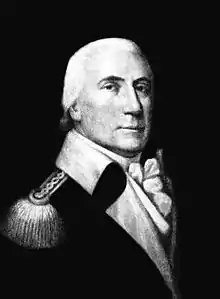
The Senators elected a President (Alexander Martin), Clerk (John Haywood), Assistant Clerk (Sherwood Haywood), Doorkeeper (William Murphy), and Assistant Doorkeeper (Nicholas Murphy). The following Senators were elected by the voters of North Carolina to represent each county:[3][4][5][12]
| County | Senator |
|---|---|
| Anson | Stephen Miller |
| Beaufort | John Smaw |
| Bertie | Jonathan Jaycocks |
| Bladen | Thomas Brown |
| Brunswick | Dennis Hawkins |
| Burke | Charles McDowell |
| Camden | Isaac Gregory |
| Carteret | John Easton |
| Caswell | Dempsey Moore |
| Chatham | Ambrose Ramsey |
| Chowan | Michael Payne |
| Craven | James Coor |
| Cumberland | Thomas Armstrong |
| Currituck | Willis Etheridge |
| Davidson | Anthony Bledsoe |
| Dobbs | John Herritage |
| Duplin | James Gillespie[note 5] |
| Edgecombe | Elisha Battle |
| Franklin | Henry Hill |
| Gates | Joseph Riddick |
| Granville | Howell Lewis |
| Greene | Vacant |
| Guilford | Alexander Martin |
| Halifax | Benjamin McCulloch |
| Hertford | Thomas Wynns |
| Hyde | Abraham Jones |
| Johnston | Arthur Bryan |
| Jones | Frederick Hargett |
| Lincoln | Robert Alexander |
| Martin | Vacant / Unknown |
| Mecklenburg | James Harris |
| Montgomery | Samuel Parsons |
| Moore | Henry Lightfoot |
| Nash | Hardy Griffin |
| New Hanover | John A. Campbell |
| Northampton | Samuel Lockhart[note 6] |
| Onslow | John Spicer[note 7] |
| Orange | William McCauley |
| Pasquotank | Thomas Relfe |
| Perquimans | William Skinner[note 8] |
| Pitt | John Williams |
| Randolph | Edward Sharpe |
| Richmond | Henry William Harrington |
| Rowan | Griffith Rutherford |
| Rutherford | James Miller |
| Sampson | Richard Clinton |
| Sullivan | Vacant |
| Surry | John Armstrong |
| Tyrrell | John Warrington |
| Wake | Thomas Hines |
| Warren | John Macon |
| Washington | Vacant |
| Wayne | Burwell Mooring |
| Wilkes | Benjamin Herndon |
Legislation
The assembly passed the acts concerning:[13]
- establishing a post-war militia
- jurisdictions of the Court of Pleas and Quarter Sessions, North Carolina justice of the peace and other courts
- regulation of commerce and imports
- collection of public debt
- emitting paper currency
- regulating the towns of Wilmington, Edenton, and Fayetteville; regulating and restraining the conduct of slaves and others in these towns
- securing and quieting forfeited estates
- raising revenues and suppressing excessive gambling
- levying taxes and redemption of Continental money
- opening land offices
- dealing with traitors and loyalists
- registration of marriage contracts
- liquidating accounts of officers and soldiers of the continental line and reviving district board of auditors for a limited time
- relief of disabled veterans of the late war
- recovering artillery belonging to the state that was thrown into the river at Edenton
- settling accounts between the United States and the state of North Carolina
- making provision for the poor, including building houses for them
- regulation of the town of Tarborough
- resolving disputes regarding building mills in certain counties
- relief of children and widows of soldiers that died in the service of the United States
- creating Rockingham County from Guilford County and selecting board of trustees for Salisbury Academy in Salisbury District
- annexing part of Pitt County to Beaufort County
- preventing blocking or obstructing of ways leading to houses of public worship
- empowering County Courts of Pleas and Quarter Session to deal with public roads, ferries and bridges
- securing literary property
- duties and salaries of public printer
- destruction of wolves, wildcats, panthers, bears, crows, and squirrels in several counties
- promoting learning in Davidson County at Davidson Academy
- establishing Grove Academy in Duplin County
- conveying common land to Smith Academy in Edenton
- establishing Kinston Academy in Dobbs County
- repairing jails and court houses, establishing a gaol in Edenton District
- changing the location of the county court in Beaufort County from Bath to Washington
- acts dealing with personal estates
- pardoning the citizens of Washington, Sullivan and Green counties if they return to allegiance to North Carolina
- establishing a Superior Court in Davidson County
- temporarily preventing distillation of spirituous liquors in Davidson County
- appointing tobacco inspectors in some counties
- establishing towns: on the land of Whitmell Hill in Martin County on the Roanoke River; on the lands of Luke Mizell and William MacKay in Martin County; on the land of Mial Scurlock in Chatham, County; on the land of Jessee Peacock in Sampson County; in Lincoln County; at Guilford Courthouse named Martinville; in the fork of the Cumberland and Red River on the east side of the Red River in Davidson County; Morgan in Morgan District
For additional details on minutes of the assembly and laws, see Legislative Documents.[13]
Notes
- Winston Caswell was the son of Richard Caswell.
- James Terry was unacceptable as a delegate because of his Loyalist past. The assembly requested a new election in Anson County in December 1785 for the next General Assembly.
- There were problems with Thomas Jordon's qualifications because he held the position of Entry Taker. A new election was requested and the voters again elected Thomas Jordan.
- Nehemiah Norman died on December 28, 1785.
- Although elected to the Council of State on December 11, James Gillespie is thought to have finished his term in the Senate.
- Samuel Lockhart was elected Sheriff of Hyde County and had to resign his position in the Senate. A new election was required at the end of December.
- Although John Spicer was elected to Council of State, it is thought that he fulfilled his term in the Senate.
- William Skinner was elected to another office, the Continental Loan office, Treasurer of the Continental Loan Office, on December 14, 1785. He was required to resign as delegate.
References
- "North Carolina Constitution of 1776". Yale Law School. 1776. Retrieved September 4, 2019.
- Norris, David A. (2006). "North Carolina Capitals, Colonial and State". NCPedia.org. Retrieved September 4, 2019.
- Connor, Robert Diggs Wimberly, ed. (1913). A Manual of North Carolina (PDF). Raleigh, North Carolina: E. M. Uzzell & Company. Retrieved April 27, 2019.
- Wheeler, John Hill, ed. (1874). The Legislative Manual and Political Register of the State of North Carolina for the Year 1874. Raleigh, North Carolina: Josiah Turner, Jr.; State Printer and Binder. Retrieved April 9, 2019.
- Cheney, John L. Jr. (1974). North Carolina Government, 1585–1974. pp. 160, 164, 215–217.
- Smith, William S. (1994). "John Spicer". NCPEDIA. Retrieved November 18, 2019.
- Lewis, J.D. "North Carolina State House of Commons of 1785". The American Revolution in North Carolina. Retrieved April 17, 2019.
- Arthur, John Preston (1914); [sic] "History of Western North Carolina – Chapter VI – The State of Franklin"; John Preston Arthur; 1914; (HTML by Jeffrey C. Weaver); October 1998. Retrieved from New River.
- Troxler, George W. (1996). "State of Franklin". NCPEDIA. Retrieved November 18, 2019.
- Maupin, Armistead Jones (1979). "John Gray Blount". NCPEDIA. Retrieved November 18, 2019.
- Rumple, Jethro (1916). A History of Rowan County, North Carolina Containing Sketches of Prominent Families and Distinguished Men. Daughters of the American Revolution. Elizabeth Maxwell Steele Chapter (Salisbury, N.C.). pp. 87–89.
- Lewis, J.D. "North Carolina State Senate of 1785". The American Revolution in North Carolina. Retrieved April 17, 2019.
- Secretary of State, ed. (1785). Laws of North Carolina, 1785 (PDF). Retrieved November 18, 2019.